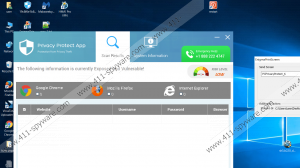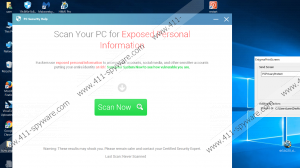PCPrivacyProtect Removal Guide
PCPrivacyProtect is known to be a rogue program. To put it differently, it is not what it claims to be. We can assure you that it is not a beneficial piece of software that can prevent the privacy theft. Instead, it is a Trojan infection seeking to scare users into contacting “certified security experts.” Most probably, it wants computer users to call them so that cyber criminals could convince them to purchase an expensive program or gain access to the system and steal personal information. Because of this, we suggest that users ignore the telephone number they see on this rogue program despite the fact that PCPrivacyProtect tries to convince them that their personal information has already been exposed. Needless to say, you cannot keep this Trojan infection on your computer as well. It does not have an uninstaller because it is not an ordinary application, but it should not be very hard to delete it because, technically, this threat has not been installed on your computer. Instead, it works straight from its executable file PCPRIVACYPROTECT.EXE. We give you a promise – you will find more about its removal further in this report.
Once PCPrivacyProtect is launched, it opens a window “Scan Your PC for Exposed Personal Information.” It claims that hackers might use the exposed personal information to gain access to users’ social media accounts, bank accounts, and other personal accounts. Also, users get a recommendation to scan the system. If the Scan Now button is clicked, PCPrivacyProtect pretends to perform the scan and then shows a window with the list of exposed information. Since PCPrivacyProtect is a completely rogue program, it would be foolish to believe these “scan” results. Do not let warning messages it shows scare you into contacting “experienced specialists” as well. We are sure that your privacy is fine. What we are also sure about is that the promoted telephone number +1 888 222 4747 might belong to cyber criminals. If you call them, they might try to sell you expensive software you do not even need because your privacy is fine. On top of that, they might ask you to tell some personal details and, if you provide them, they might use it for fraudulent purposes. Finally, you cannot be so sure that this number is a toll-free telephone number either. What you should do instead of trying to contact these fake technicians is to go to delete the Trojan infection from your PC as soon as possible. You cannot keep it active because it will continue displaying fake warnings. Also, other threats might enter your system easier if you keep it there.
Specialists at 411-spyware.com know about two distribution methods used to spread PCPrivacyProtect. They have made a finding that this Trojan infection might travel bundled with other applications in malicious software bundles. Also, they say that it can be promoted by malicious pop-up advertisements. They are usually offering the free system/security scan. If a user clicks on such a pop-up, the infection ends up on the system right away and starts doing its job. If you see various commercial advertisements on your screen every day, there is a huge possibility that you have another untrustworthy application, most probably, adware, installed on your computer. You must delete it to stop the flow of ads. We know well how hard it might be to prevent malware from entering the system, so we recommend installing security software right after getting rid of PCPrivacyProtect. It will make it impossible for other Trojans and malicious applications to show up on your computer.
PCPrivacyProtect has not, technically, been installed on your computer, so the only thing you need to do to make it gone from your system is to remove the executable (.exe) file belonging to it. That is, you must eliminate its launcher. It should be located in three different directories (find them listed in our manual removal guide), and you must remove it from all of them. If you find it too difficult to delete this infection manually, you should use an automatic malware remover. Use only reputable software!
Delete PCPrivacyProtect
- Open Explorer (press Win+E).
- Open %USERPROFILE%\Downloads, %TEMP%, and %USERPROFILE%\Desktop.
- Delete PCPRIVACYPROTECT.EXE from all these three directories.
- Empty Recycle bin.
PCPrivacyProtect Screenshots:



